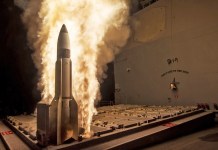The UK government’s ‘Defense Command Paper 2021’ has outlined its ambitious plans about how it would fight future wars in space and cyberspace.
According to the 76-page document published on March 22, the UK will trim the size of its military, which is already at its lowest numerical strength since its inception more than 350 years ago.
Analysts say the country is also planning to reduce its F-35 fighter fleet by more than two-thirds amid a record budget hike — £16.5-billion ($22 billion) — the highest since the cold war, despite the pandemic.
So, where all this money would be spent on? The paper says the focus would be not just on the domains of land, air, or the seas, but also in space and cyberspace.
The UK government’s Integrated Defense Review published a week earlier described Russia as posing the “greatest nuclear, conventional military and sub-threshold threat to European security”, while the Chinese expansionism is seen as “the most important geopolitical factor in the world today”.
Apart from these two, Iran and North Korea are seen as probable actors whose actions could destabilize global peace and tranquillity with their nuclear programs.
With conventional forces still being kept although, in smaller numbers, the Army is focusing more on increasing Special Forces battalions, which are more capable of securing the UK’s national interests anywhere in the world with a high degree of professionalism and efficiency.
Russia and China’s preparedness in the space domain has already been cautioned by the United States in its congressional report released last year, and similarly has affected almost all the countries in Oceania and the West.
Cyber attacks, too, have increased exponentially in recent years, posing threats to power supply, internet connectivity, and communication lines.

“As with cyberspace, the UK intends to help shape the rules and norms governing space. It sets a goal of having the ability to monitor, protect and defend our interests in and around space by 2030,” the report mentions.
Over the next decade, the UK will spend a total of £5 billion on Skynet, the network of military communications satellites. European aerospace giant Airbus, which secured the Skynet 6A contract last year, has reached the preliminary design review phase.
“In addition to Skynet 6, an additional £1.4 billion will be spent on establishing a new Space command and a National Space Operations Centre, develop a UK-built Intelligence, Surveillance, and Reconnaissance satellite constellation and create a Space Academy.”
The Integrated Defense Review also mentioned that Britain is the third-most powerful cyber-nation in the world, ranking top in defense, intelligence, norms, and offensive capabilities. The United States, China, and Russia are rapidly expanding in the space warfare domains, while also maintaining strong conventional military forces.
Britain, which is rapidly cutting down on its gear finds itself in a favorable position to utilize the funds for modernization and emerge as a global superpower in the decades to come.
(Written by Ayush Jain)





